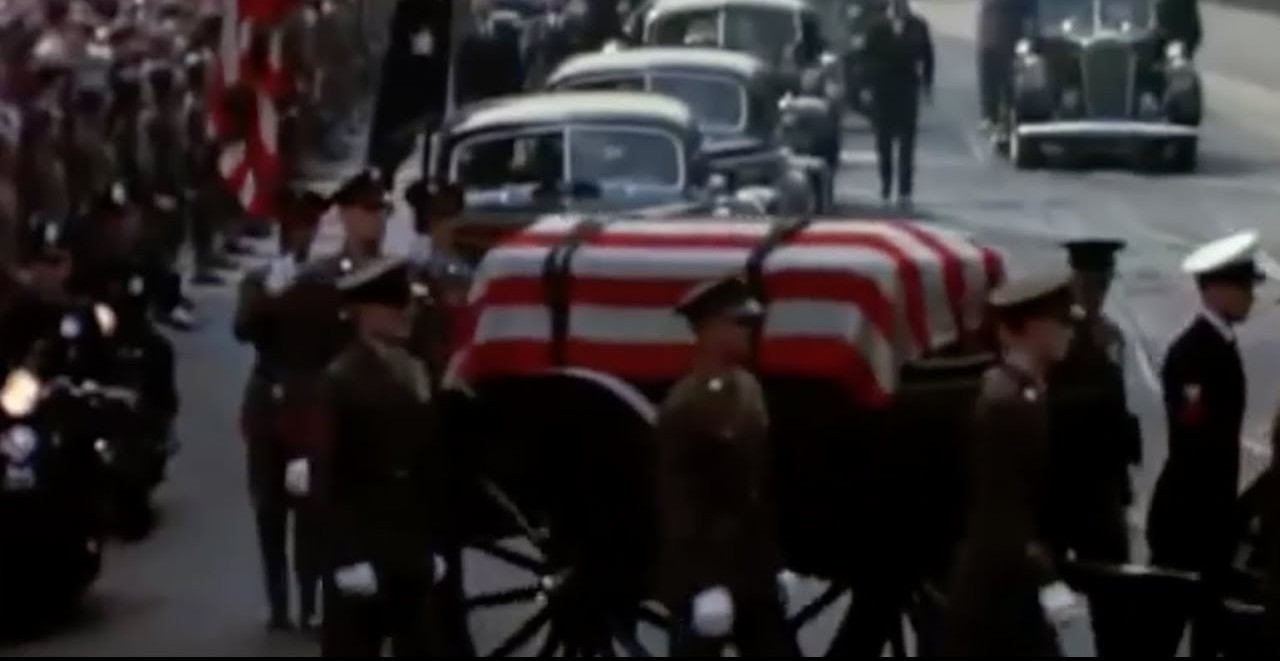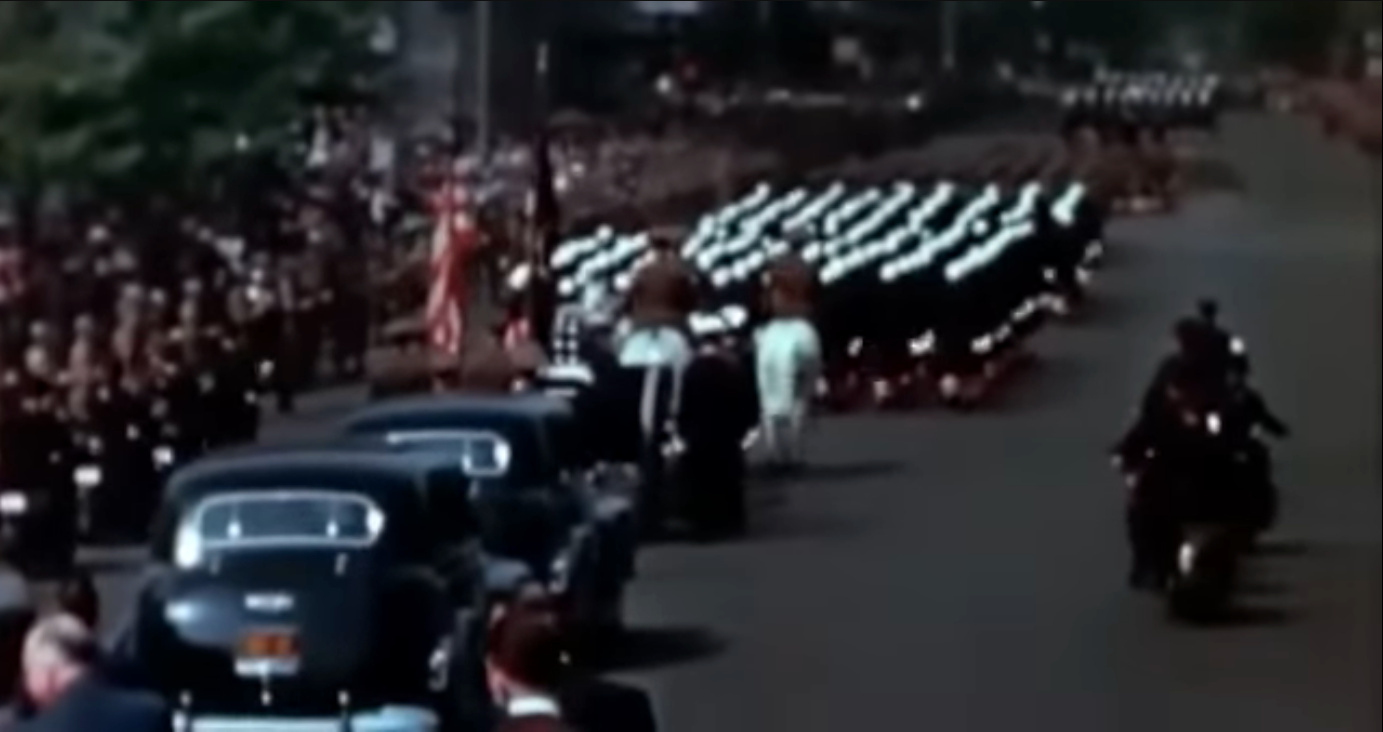White House is the climax –
Fate’s strange quirks dot Truman career
Success attributed to staunch loyalty
KANSAS CITY, Missouri – Fate has slipped strange quirks into the political career of Harry S. Truman but it played the climactic card last night when he was sworn in as President of the United States.
Mr. Truman’s success and his rapid rise in the world of politics is attributed to his loyalty to superiors. First it was faithful support of Tom Pendergast, long-time political boss of Missouri and that loyalty, continued when Pendergast’s machine was broken and the leader sent to prison.
In Washington, Mr. Truman was one of President Roosevelt’s strongest supporters. He was staunchly behind Roosevelt policies throughout his stay in the Senate.
Now he is thrust into the job of supplying the leadership to make those plans a reality. Instead of a loyal follower, he now is the leader.
Remains ‘Harry’
An affable little man who didn’t even want to be vice president and who demands that he remain “Harry” to folks who know him – that’s the 32nd president of the United States.
When Harry S. Truman left his seat in the Senate to become vice president, he made it plain to newspapermen that he didn’t want his new job to “make any difference.” And those who know him say that still goes, even though he is now President of the United States.
The story of Harry Truman is one that could have taken place only in this country. His path from a Missouri farm to the White House led him through various commonplace jobs and then into politics.
Boss said ‘No’
Ten years ago last spring, Mr. Truman, just finishing a term as a judge of the Jackson County Court, went to Pendergast, whose political star then was at its zenith, and asked to be put on the Democratic ticket as a candidate for county collector.
“No,” Pendergast answered quickly and definitely. “No.”
The loyal Truman was puzzled. It wasn’t the reply he had expected and he knew not what to say. But the “boss” made it easy. “You’re going to run for United States senator,” he said, just as he might then have told a lesser adherent he might run for road overseer.
Mr. Truman was elected, then was reelected six years later when the “boss” had fallen, and then last January, against his expressed desire, he became vice president of the United States.
Worked hard in Senate
Most persons who read the newspapers know the story there is to tell of Sen. Truman and the intervening decade. It begins with his employment in Washington of an acute, alert mind, and intense, painstaking industry – perhaps his outstanding asset to make himself a recognized factor in the Senate and thereby useful to his constituents. Added to that equipment has been his characteristic loyalty to persons or groups with claims on his services.
Returning from World War I as major of an artillery unit he had helped organize and which he took overseas, he allied himself with the Democratic party here. That was in the early 1920s.
Becomes county judge
Leaders saw in Mr. Truman a “bright young man” who knew his way about in the labyrinth of county politics and set store by him. They gave him a place on the county ticket in 1922 and he was elected judge of the county court. He was defeated for reelection, but tried again in 1926 and was elected presiding judge, a place he held until he went to the Senate.
In Missouri, three “judges” conduct the county business. They exercise no judicial functions. In some other states they would be called county commissioners.
Knowing Mr. Truman’s penchant for loyalty, it was not difficult to understand what followed. While he had been serving his first term in Washington the Kansas City machine strong house, which was actually a house of cards, top-heavy with power, toppled. Pendergast and scores of his minions were indicted on charges that Democratic district attorney Maurice M. Milligan made stick.
Some quit, not Truman
Some lesser and some greater beneficiaries of the machine and its boss washed their hands of both or turned their backs, but not Sen. Truman. When told in Washington that Pendergast had been indicted by a federal grand jury, his only comment was: “I’m sorry it happened, but I’m not going to desert a ship that is going down.”
It was his loyalty to President Roosevelt and the New Dealers that gave him re-election in 1940. The crew that had sent him to the Senate in 1934 with a whopping majority was under a cloud. Vote frauds at its hands, exposed and vigorously prosecuted by the crusading district attorney, had sent ward-heelers and even machine leaders scurrying for cover. Many were in jails. There were suicides, disappearances, and Pendergast, himself, faced a penitentiary term.
Tough opposition
At that unpropitious period Sen. Truman’s term expired.
District Attorney Milligan ran against him im the primary. Gov. Lloyd C. Stark, who had put one of the early time fuses under the Pendergast machine, also entered the race against Truman. Both hard-fighting men traversed the state shouting “bossism” at Sen. Truman and citing the source of his support.
Mr. Truman made no reply, not even to deny continuing loyalty to the machine. He made his campaign as “The right arm of the president,” 100 percent loyalty to him and the New Deal. He never mentioned state affairs. but talked of national and international problems.
With his opposition split two ways, Mr. Truman squeezed through to a nomination, and swamped his Republican opponent in the general election.
Earned respect
Even in his first term, still tethered to the machine, Sen. Truman asserted personal characteristics that won places for him on important Senate committees, and earned the respect of his fellow senators and of the administration. His undeviating loyalty to the New Deal caught White House attention. His tireless energy led less willing Senators to load him with legislative matters that might not have fallen to him otherwise.
Fearless investigator
His fearless conduct as chairman of the Senate War Investigating Committee – long known as the Truman Committee – proved clearly his high sense of responsibility in public office. His committee spared no one, not even high administration figures, if it thought their war leadership deserved public criticism.
Under his leadership the committee made government savings estimated at upwards of a billion dollars.
Its investigators pried into war plants, shipyards, and Army and Navy contracts, and the committee’s activities eventually led indirectly to the concentration of war production authority under one man, Donald M. Nelson.
Was good listener
And behind it all was the former Jackson County judge who promised, when he first went to the Senate, to “do a lot of listening and mighty little talking.” He has kept the promise personally, but his work through the years of preparation and war have spoken loudly for him.
He never has posed as a statesman. In his own words, expressed years ago, he “just works at whatever he has to do.”
Sen. Truman will be 61 years old May 8. He is a scion of two pioneer western Missouri families who came to Jackson County in 1842.
His mother, Mrs. Martha Truman, 92 years old, speaks glowingly even now of Harry’s willingness to work when he was a farm boy and of his ability to plow the straightest row to be found on any farm in Jackson County. There is another son, J. V. Truman, who farmed the Truman acres for many years and now is with the FHA, of whom the mother speaks with pride.
Mother preferred Senate
Before he was nominated for the vice presidency, Mr. Truman’s mother said she hoped her son would remain in the Senate.
After the nomination, Mother Truman said: “I liked him just as well before he got the nomination.”
High school, at Independence, was the limit of the Senator’s formal education but he went right on educating himself.
“I read everything in the Independence Library, including the encyclopedia, before I quit school,” he once said. “I’ve always been sorry I did not get a university education in the regular way. But I got it in the Army the hard way and it stuck.”
In 1919, Truman married Miss Bessie Wallace of Independence. They have a daughter, Margaret, who has attended school in Washington while the family has lived in the capital.
Incidentally, the middle initial “S” in the nominee’s name stands for Shippe, which was the middle name of his grandfather.



